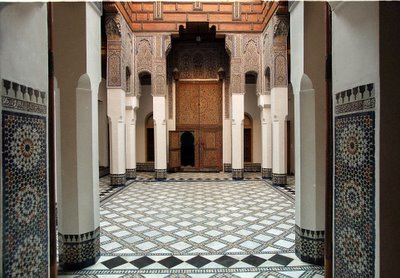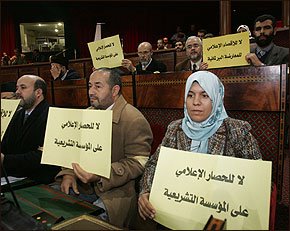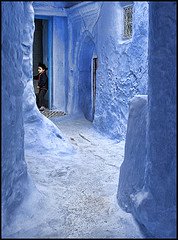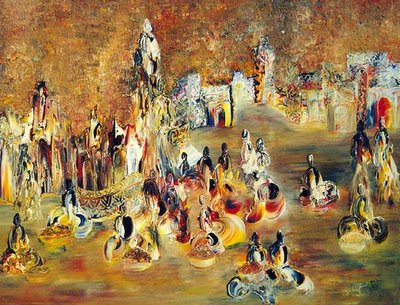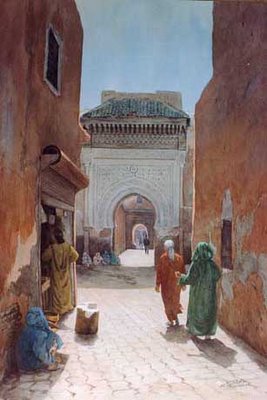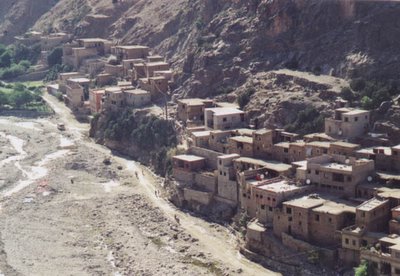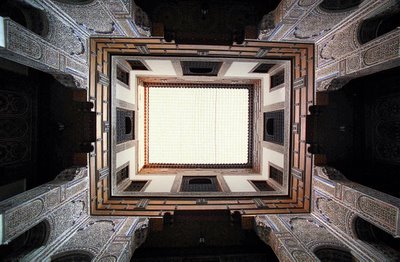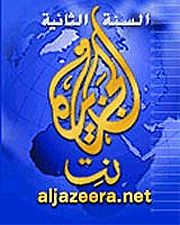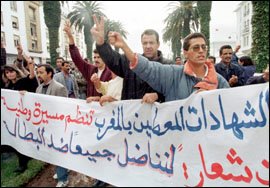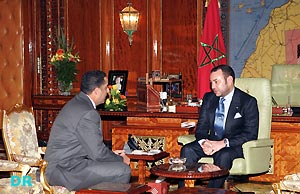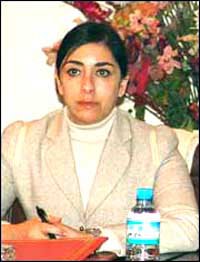Moroccan News Briefs published in The View From Fez draw on open source material, contributions from readers, as well as material from Maghreb Arabe Presse (MAP), Morocco Times and official Moroccan Government press releases.JOURNALISTS PROTEST LOW WAGESJournalists of the state-owned Maghreb Arab Press Agency (MAP) on Thursday staged a sit-in before the Finance Ministry to protest low wages and call for reviewing their financial situation which "is deteriorating because of the government's policy vis-à-vis this institution."

The National Union for Moroccan Press (SNMP) had called for the sit-in to "protest the non implementation of the Agency's Board of Governors of the decision on increasing the salary of journalists, made during its meeting held in November 2004."
A delegation of the Union, led by its Secretary General Younès Moujahid, handed a memorandum to the Finance and Privatization Minister, Fathallah Oualalou. The document deplores that "many requests submitted to MAP's governing board since 1998 have been frozen."
The memo recalls that the governing board adopted unanimously in November 2004 a decision on "the increase of salaries of journalists, awaiting a global review of the situation of MAP employees part of a new legal framework."
SNPM called on the Finance and Privatization Ministry to speed up examining other requests on the situation of MAP journalists "whose wages are considered among the lowest in the press and media sectors."
VIETNAMESE-MOROCCAN TIES STRONGER
Speaker of the Vietnamese House Nguyen Van An’s ongoing visit to Morocco will contribute to boosting bilateral relations, President of the Moroccan House of Representatives said Thursday.
The visit would “lift the relationship between the two parliaments to a new height and strengthen friendship between the two peoples,” Abdelwahad Radi said at their meeting.
National Assembly Chairman An arrived in the Moroccan capital Rabat earlier the same day on his first official visit, marking the final leg of his North Africa tour which also included Algeria and Tunisia.
The two countries should further tap their great potential for cooperation, especially economic, An said.
At the meeting, the leaders signed an agreement for cooperation between the Moroccan House of Representatives and Vietnamese National Assembly.
Morocco wants to develop multi-dimensional ties with Viet Nam, Moroccan Prime Minister Driss Jetou told visiting Vietnamese National Assembly Chairman Nguyen Van An in Rabat on December 22.

At the meeting, the Moroccan PM expressed his admiration at what Viet Nam has achieved in its past struggle for national liberation and current renovation process.
“Viet Nam is a worthy example for developing countries like Morocco to follow,” PM Jetou said. He said he believed that with socio-political stability Viet Nam will advance its economy rapidly and substantively in the coming time.
The Moroccan PM assured NA Chairman An of his country’s support for Viet Nam’s bid for WTO membership. He recalled that he and Prime Minister Phan Van Khai, during the latter’s Morocco visit in late 2004, agreed to boost economic and trade ties, particularly in textiles, electronics, and electrical cables, where Morocco has great demand.
The Moroccan PM said he would make a visit to Viet Nam next year to discuss measures to lift cooperation between the two countries to a new height.
NA Chairman An briefed the PM on the results of his talks with House of Representatives Speaker A. Radi, affirming that the two countries’ parliaments will continue to boost their relations in all areas.
He said that the Vietnamese NA welcomes and supports its Government’s action plan on Viet Nam-Africa ties in the 2004-2010 period, and that he wants the Moroccan Government and Prime Minister to help in encouraging its ministries and businesses to actively work with the Vietnamese side in realising the plan.
On December 23, NA Chairman An and House of Representatives Speaker A. Radi attended the Viet Nam-Morocco Economic Cooperation Forum. Speaking at the event, which drew more than 100 Vietnamese and Moroccan entrepreneurs, the Vietnamese legislative leader emphasised that entrepreneurs themselves are the most active and effective element helping to bring the two countries closer in the current circumstance.
“It is my belief that businessmen, with their clear-headedness and enthusiasm, will help increase the two countries’ economic ties, trade and investment,” NA Chairman An said.
Later the day, the Chairman attended the official opening of the Vietnamese Embassy in Morocco. The Vietnamese leader paid a floral tribute to King Mohammed V and King Hassan II at their mausoleum. As scheduled, NA Chairman An will visit the ancient city of Fès before leaving Rabat for home to conclude his three-day visit to Morocco.
3000 EURO PRIZEThe European Commission is going to hold an international competition among the journalists activate in the field of cultural heritage.
Journalists will be asked to submit their reports about two historical sites in the Mediterranean Sea region to the commission. Tthe deadline for submitting the reports is March 31st, 2006.
Only the reporters and journalists from Palestine, Egypt, Algeria, Morocco, Turkey, Syria, Israel, Tunisia, and European countries are allowed to participate in this competition.
The winner will be awarded 3000 Euro and the expenses of a trip. The best reports will be published in the bulletin and on the website of the commission.
FREE TRADE DEAL ON JAN 1.U.S. President George W. Bush signed an order on Thursday to bring a free trade agreement with Morocco into force on January 1.
"Morocco is a close friend and ally of the United States, and this (free trade agreement) sends a powerful signal that the United States is firmly committed to supporting tolerant and open Muslim societies," said a White House spokesperson.
Under terms of the pact, completed in March 2004, the United States and Morocco agreed not to use agricultural export subsidies in each others' markets.
Morocco agreed to provide preferential market access for all U.S. agricultural products by phasing out tariffs in installments on a product-specific basis.
Negotiations on a US-Morocco Free Trade Agreement began in January 2003 and ended in March 2004. The Agreement passed the US House of Representatives and the Senate in July and was signed by President Bush in August 2004
The United States is aggressively working to open markets globally, regionally, and bilaterally and to expand American opportunities in overseas markets.The Bush Administration has completed FTAs with 13 countries – Chile, Singapore, Australia, Costa Rica, the Dominican Republic, El Salvador, Guatemala, Honduras, Nicaragua, Morocco, Bahrain, Oman and Peru. Negotiations are under way with ten more countries: Colombia, Ecuador, the United Arab Emirates, Panama, Thailand, and the five nations of the Southern African Customs Union (SACU).
RAM LAUNCHES ONLINE SITE
The national airline,
Royal Air Maroc (RAM) has just launched a more powerful on-line reservation tool on its site:
www.royalairmaroc.com
We checked out the new system and it works extremely well. It is based on a series of codes: “
EcoRelax”, giving special one-off offers, “
EcoPromo” (year-long promotions), “
EcoSemiFlexible” (advantageous prices with easier conditions), “
EcoFlexible” (full economic tariff completely flexible) and “
ExecutiveClass” (business tariffs).
CAPTURE OF MAN WITH WEAPONS
Moroccan security forces arrested a man in possession of 13 Hawn rockets near Laâyoune. The man, 33, identified as J.T is a former detainee in The Polisario-controlled Tindouf camps (southwestern Algeria) who returned to Morocco before emigrating to Spain.
The ammunition seized was destined for terrorist use in the region by a network whose members are wanted by police.
Although they date back to the Sahara war that opposed Morocco to the separatist movement up to early 90s, the ammunition could still be used.
A Ceasefire was proclaimed, in September 1991, between Morocco and the Algerian-backed Polisario who lay claims to the Kingdom's Southern provinces, known as the Sahara. The former Spanish colony was retrieved by the North African country in 1975 under the Madrid Accords.
The suspect was arrested in the desert some 26 km to the south of Laâyoune on December 19.
TOLL FREE NUMBER FOR WOMEN VICTIMS OF VIOLENCEThe Moroccan Government has for the first time launched a toll free number (080008888) to provide judiciary advice and protection for women and girls victims of violence. The initiative is part of a national strategy to combat violence against women, drawn up by the State Secretariat in charge of Family, Children and Disabled in collaboration with several departments and NGOs to assist the victims.
According to a recent survey, domestic violence is increasing in Morocco where more than 60 per cent of violence cases concern married women aged 20 to 49 and 59.8 pc of cases are the consequence of disputes over child custody, divorce and alimony.
Counseling centers will be provided by the Secretariat of State in coordination with the concerned governmental departments, including the Justice and Health Ministries, the Police and the Royal Gendarmerie. The aim is to promote judicial and psychological care for women and girls victims of violence.
To tackle the issue of violence against women, the Moroccan Government ratified a number of international conventions banning domestic violence against women and improved the status of women thanks to a new Family Code enforced in January 2004.
SEVEN "TETUAN GROUP" MEMBERS ACQUITTEDOn Friday the appellate court of Salé acquitted seven members of "Tetuan Group," who were indicted in the framework of the anti-terrorist law.
They had been charged with "constituting a criminal gang with the objective of committing terror acts, holding un-authorized public meetings, exercising activities in an un-recognized association and inciting to commit terrorist acts."
WEEKLY SUED FOR "FALSE INFORMATION"The Casablanca general prosecutor has decided to sue the director and a journalist in the Moroccan weekly,
Al Ayam, for the publication of an issue titled "Secrets of the Harem among Three Kings."
Nour Eddine Miftah, director, and Meriem Moukrim journalist in the Arabic-speaking weekly will appear before the court on January 23 for "diffusing false information," and "publishing photos of the members of the royal family without prior authorization from the royal cabinet."
According to the Press Act, the two journalists are liable for up to one year in prison and a fine that can reach USD 10,000.
The weekly deems, in a press release, that “the problem of the press today consists in an unjustified embarrassment vis-à-vis certain margins (…) that should first be addressed among journalist before having recourse to the justice.”
Tags: Morocco, Fès, Maghreb, news
